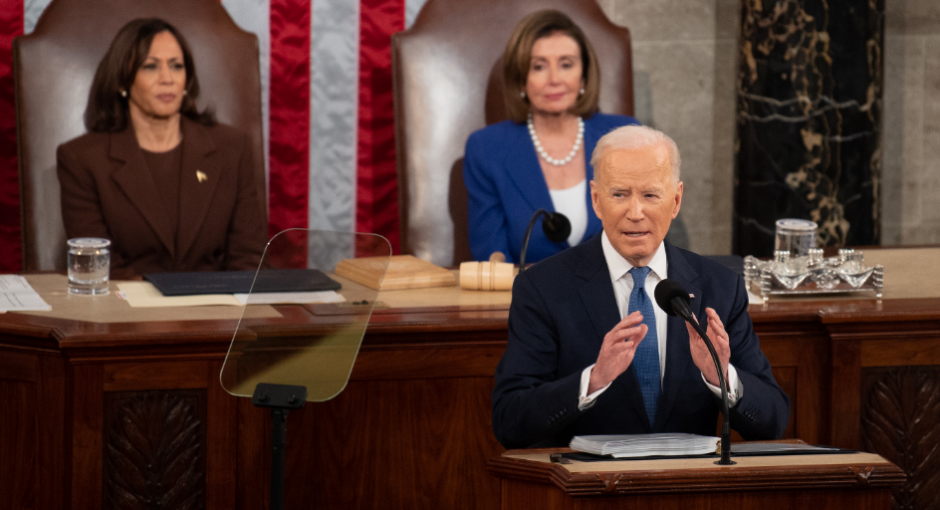President Biden urged Congress in his State of the Union message Tuesday night to cap monthly cost sharing for insulin at $35 and let Medicare negotiate what it pays for prescription drugs.
Biden said cutting the cost of prescription drugs was at the top of his plan to fight inflation and get prices under control.
“Just look at insulin,” he said. “One in 10 Americans has diabetes. … Insulin costs about $10 a vial to make. But drug companies charge families … up to 30 times more. … Let’s cap the cost of insulin at $35 a month so everyone can afford it. Drug companies will still do very well.”
“And while we’re at it,” Biden continued, “let Medicare negotiate lower prices for prescription drugs, like the VA [U.S. Department of Veterans Affairs] already does.”
Biden did not say whether Congress should do both in the same bill. Nor did he mention other elements of comprehensive drug pricing legislation that the House has passed but not the Senate. They include an inflation penalty on Medicare drugs when the price of a product rises faster than inflation and capping out-of-pocket spending for Medicare Part D enrollees at $2,000 per year.
U.S. Senate Majority Leader Chuck Schumer (D-N.Y.) has pledged to call for a Senate vote this month just on capping out-of-pocket costs of insulin products at $35 per month for people with private health plans, Medicare Part D plans, and Medicare Advantage drug plans. For commercial plans, the cap would apply to one of each dosage form of each different type of insulin. For Medicare plans, the cap would apply to all covered insulin products. A companion bill has been introduced in the House.
Schumer’s decision to hold a vote just on lowing the cost of insulin has cast a shadow over the comprehensive reform bill’s other elements. Biden’s call for letting the government negotiate prices for some high-cost drugs covered under Medicare Parts B and D could improve that element’s prospects.
U.S. Senate Finance Committee Chair Ron Wyden (D-Ore.) said after the speech that, to “deliver on our promise to lower Americans’ health care costs,” Democrats must use “the bargaining power of 50 million seniors in Medicare to negotiate lower drug prices.”
Patients for Affordable Drugs founder David Mitchell said after the speech said, “For two decades, Americans have been targeted by drug companies that established a system that prevents our government from negotiating on our behalf. It is imperative that the Senate pass a package of reforms that will couple copay and out-of-pocket caps with provisions that drive down prices by empowering Medicare to negotiate lower prices and limiting year-to-year price increases to truly lower costs — not just shift them around. Otherwise, Americans will wind up paying more through higher premiums and taxes.”
The drug industry is adamantly opposed to letting Medicare negotiate drug prices.
“Allowing the government to set the price of medicines isn’t the answer. We know that story will end with less access to medicines and less future innovation,” Pharmaceutical Research and Manufacturers of America (PhRMA) President and CEO Stephen Ubl said in a statement in response to Biden’s speech. He said the president and Congress should focus on lowering costs for patients, addressing “abusive practices” within the insurance system, and aiding the development of new cures and treatments.
The Campaign for Sustainable Rx Pricing (CSRxP), whose members represent hospitals and other providers, group purchasing organizations, practitioners, payers, and pharmacy benefit managers, said after Biden’s speech that “the American public is watching closely, ahead of the midterm elections later this year, to see if lawmakers will meet the moment to deliver relief for the millions of families who experience financial hardship affording their medications.”
CSRxP Executive Director Lauren Aronson called for capping out-of-pocket costs in Part D, giving drug manufacturers “significant cost sharing responsibilities in the catastrophic phase” of Part D coverage, prohibiting price hikes that exceed inflation, “pulling back the curtain on Big Pharma’s predatory pricing practices,” ending “Big Pharma’s patent abuses,” encouraging cheaper generics and biosimilars, and incentivizing R&D that improves drug therapy meaningfully.


